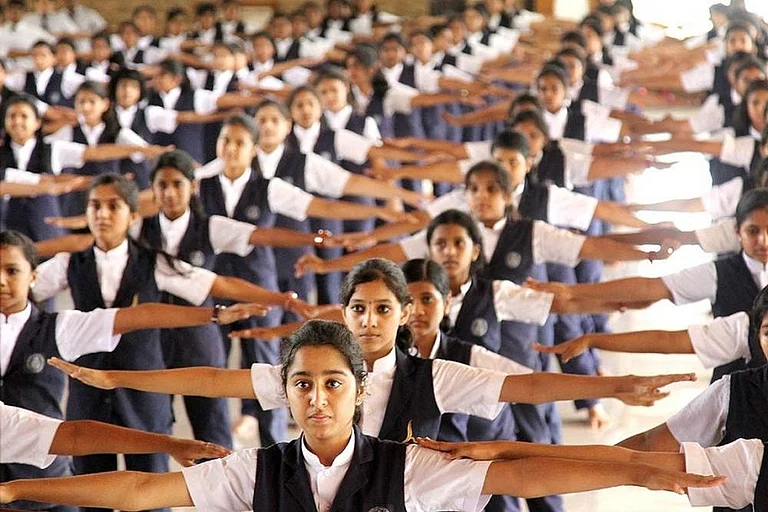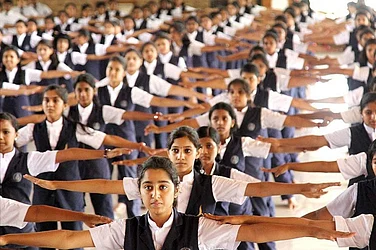“What’s in a name?” Four centuries ago, when William Shakespeare wrote the classic Romeo and Juliet, he was referring to the idea that names themselves do not have any worth or meaning, but are a mere convention to distinguish things or people. “A rose by any other name would smell as sweet,” wrote Shakespeare. “India, that is, Bharat, shall be a Union of States,” says the very first Article of the Constitution of India, stressing that the focus is on the people rather than the nomenclature.
Rattled by the emergence of a new coalition with the acronym INDIA (Indian National Developmental Inclusive Alliance), a jittery Modi camp is now trying to pit India against Bharat, thereby once again revealing its contempt for the Constitution of India. However, we all are, by now, aware of the Modi school of propaganda and his fondness for abbreviations and acronyms in order to create a buzz around his government’s schemes. So much so that 52 of the Bharatiya Janata Party (BJP) government’s schemes have India in their names, including Digital India, Make in India, Startup India and Skill India, and only five have Bharat. Shifting identity gears has been a trope of the BJP, and the India vs Bharat controversy is yet another ‘masterstroke’ by the BJP, rooted in a “distraction tactic” and “panic reaction” after the Mumbai conclave of the Opposition faction called itself INDIA, a coalition committed to prevent Narendra Modi from serving a third term, ahead of the 2024 general elections and the Rashtriya Swayamsevak Sangh (RSS) centenary in 2025.
Ideology is very important, but its vehicle is politics. While the ideology of the RSS unleashed vitriol against Gandhi on October 2, its ideological partner was busy plotting to launch the biggest crackdown on the Indian press. The fabled fourth pillar of democracy has effectively been co-opted in the past few years, there is even a buyout—the case of NDTV, and what has remained of independent media is being throttled by being slapped with draconian law of UAPA (Unlawful Activities Prevention Act). On October 3, almost 46 individuals associated with NewsClick were searched and questioned in the name of “national security.” Interestingly, the raid comes just a few weeks after Maharashtra BJP president Chandrashekhar Bawankule’s veiled threat of violence against journalists who write ‘negative news against BJP.’ And crucially, one of their “suspects,” Paranjoy Guha Thakurta, is a leading journalist who has been writing about the Adani Group and its business malpractices since 2015.
The game to bring opponents of any stripe or persuasion to heel has been enacted before, and so has the plotting and preparation. The Nuh violence underscores the careful preparation since the start of the year, when Muslim cattle traders were lynched. The idea was to give birth to provocation and anger. The principle of this campaign is the narrative of the “illegal outsider,” which lies at the bottom of the Hindutva ideology. In any battle against fascism, it is always helpful to bear in mind that the strength of fascism lies in its ability to combine brutal state repression with extra-judicial coercion backed by a frenzied mobilisation of the masses.
Today, after almost a decade, the BJP government is still appealing to the Hindu identity, giving it a new lease of life through the raging debate on Sanatan Dharma. Promising Indians the fictional rise of India’s stature to Viswa Guru in global standing—a propaganda campaign that reached a crescendo around the G20 summit held in New Delhi last month and, ironically, also playing the politics of the so-called victimised identity with the slogan of ‘Hindu khathre mein hai’ (Hindus are in danger)—is a part of the Sangh-BJP establishment’s attempt to blur caste lines and to consolidate support for a unified Hindu identity. The BJP’s Hindutva agenda has been busted with the release of the Bihar caste survey on October 2.
Until now, the BJP government has taken care to not run into the birth-based caste divisions within the Hindu society by choosing to fuel anti-Muslim sentiment in its narrative of nationalism. While the Sangh-BJP establishment had claimed to put caste-based politics to an end during the 2014 elections, the BJP, in fact, did the opposite. Its victory marked a reassertion of upper castes and dominant communities in north India, and a disturbing increase in atrocities or crimes against Dalits, Adivasis and women. With the rising demand for a pan-India caste census—a demand to safeguard the principles of equality and proportional representation of underprivileged communities—the BJP fears a damning indictment of its claims of having empowered Dalit Bahujan people. As the demand is bound to intensify, the cacophony of Hindutva will get louder and shriller, as the stakes are getting higher with elections approaching soon.
But India is not yet a Hindu Rashtra, and although forces to reach that goal have been unleashed, we must keep in mind that the politics of majoritarianism cannot be decisively defeated by just voting out the BJP government. India, that is Bharat, will have to summon all its strength to overcome this calamity about which Dr Ambedkar had forewarned us right at the time of the adoption of India’s Constitution. The constitutional vision of a sovereign socialist secular democratic republic must prevail over the nightmare of the all-around anarchy and crisis that this regime has inflicted on the country.
Narendra Modi’s ‘ek akela’ boast in the Rajya Sabha on February 9 this year will be countered by resistance from the people of this vast and varied land with multiple histories and geographies. The message from Patna, Bengaluru and Mumbai is very clear that a full-scale electoral autocracy where the BJP dreams of ruling for 50 years will be punctured not with sameness and uniformity, but with a diverse and powerful people’s movement and a united and assertive political opposition. The battle has only begun!
(Views expressed are personal)
(This appeared in the print as 'INDIA Will March On')
Sandeep Saurav is MLA, CPI-ML, Paliganj, Bihar






















